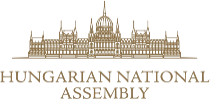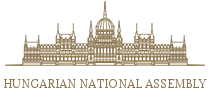When the Treaty of Lisbon came into force, it laid the groundwork for a greater involvement of national parliaments in European Union activities. There was a widening of the framework within which national parliaments could express their views on draft legal documents of the European Union as well as on matters of particular interest to them. Enhanced cooperation between national parliaments has gained momentum recently, thus contributing to the development of interparliamentary relations.
There are numerous fora for interparliamentary cooperation within the European Union, where the Hungarian National Assembly is a regular participant. Beyond the basic role of monitoring the implementation of the subsidiarity principle introduced by the Treaty of Lisbon, the most decisive and highest level of decision-making is the Conference of Speakers of EU Parliaments. The Speaker's Conference is held on an annual basis with the main goal of laying down the fundamental and strategic framework for cooperation between national parliaments. It is also important to mention the Conference of Parliamentary Committees for Union Affairs (COSAC), which brings together the EU affairs committees of national parliaments and is organised by the Member State currently holding the six-monthly rotating Presidency of the Council of the European Union. Prior to the COSAC plenary, the chairpersons of EU affairs committees may gather together to hold a preparatory meeting. Another relevant forum for cooperation is the Interparliamentary Conference for the Common Foreign and Security Policy and the Common Security and Defence Policy (CFSP/CSDP), which brings together chairpersons from parliamentary committees on foreign and defence policy from national parliaments and delegations of MEPs with competence in those areas. It is also worth mentioning the Interparliamentary Conference on Economic Governance of the European Union, which aims to provide a framework for discussing national fiscal policies and other matters falling under the scope of the Treaty on Stability, Coordination and Governance (TSCG). An important role is played by the body that monitors the activities of Europol (the European Union Agency for Law Enforcement Cooperation), which is made up of members of the national parliaments and the European Parliament, the so-called Joint Parliamentary Scrutiny Group. Furthermore interparliamentary committee meetings are convened annually by the European Parliament and national parliaments for the evaluation of the activities of the Eurojust, the European Union Agency for Criminal Justice Cooperation.
Relations between national parliaments and the European Parliament are of crucial importance in the area of interparliamentary cooperation within the European Union. Several forms already exist, and new forms may emerge in order to further underpin this level of cooperation. These forums are joint parliamentary meetings (JPM) and joint committee meetings (JCM), organised jointly by the European Parliament and the national parliament of the country holding the rotating Council Presidency to discuss subjects of common interest. Furthermore, standing committees of the European Parliament often hold interparliamentary committee meetings, where members of relevant committees from national parliaments are also invited to express their views or to participate in a debate on a specified legislative proposal. A discussion of issues tied to the European Semester takes place annually during the European Parliamentary Week, a relatively new form of interparliamentary cooperation within the EU, where Members of the European Parliament and of national parliaments are convened jointly. For more information, please visit "Relations with the European Parliament".
Beyond the institutionalised forms of European interparliamentary cooperation noted above, Member States holding the rotating Council Presidency organise meetings of chairpersons of different parliamentary committees on a regular basis; they operate according to established interparliamentary practice but are, however, less institutionalised. The agenda for a meeting of chairpersons of parliamentary committees is usually influenced by the priorities set by the Council Presidency and touches on relevant questions with which a particular committee is likely concerned.
Hungary first held the rotating Presidency of the Council of the European Union in the first half of 2011.
Hungary holds the rotating Council Presidency during the second half of 2024, which will be transferred to Poland on 1st January 2025.
In order to maintain coherence and continuity between 6-months-long presidency programmes the Lisbon Treaty has introduced the so called Presidency Trio format, a group of three member states consecutively holding the rotating presidency. Members of a Presidency Trio adopt a common presidency programme, which sets the Presidencies’ goals and the common agenda for the upcoming 18 months.
Council presidencies up to 2030
|
France Czech Republic Sweden |
January-June 2022 July-December 2022 January-June 2023 |
|
Spain Belgium Hungary |
July-December 2023 January-June 2024 July-December 2024 |
|
Poland Denmark Cyprus |
January-June 2025 July-December 2025 January-June 2026 |
|
Ireland Lithuania Greece |
July-December 2026 January-June 2027 July-December 2027 |
|
Italy Latvia Luxembourg |
January-June 2028 July-December 2028 January-June 2029 |
|
Netherlands Slovakia Malta |
July-December 2029 January-June 2030 July-December 2030 |




